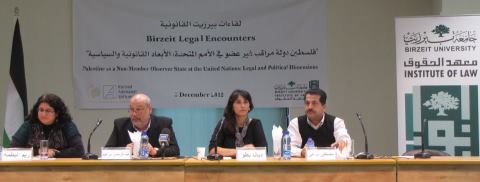Palestine as a Non-Member Observer State at the United Nations: Legal and Political Dimensions
In his opening remarks, Dr. Mustafa Mar’i, Professor of International Law and Senior Researcher at the IoL, welcomed the audience, commending their proven interest in Palestine’s promoted status as a non-member observer state at the UN. Expressing his hope that the legal encounter be constructive and purposeful, Dr. Mar’i asserted that the large number of participants indicated how vital this development is.
Dr. Abdul Rahman Ibrahim, Chairman of the Political Science Department at the Faculty of Law and Public Administration of Birzeit University, overviewed the political dimensions of enhancing Palestine’s status to a non-member observer state at the UN. Affirming this significant and serious development, Dr. Ibrahim explained that the UN General Assembly (GA) resolution “has created a new reality, which necessitates that Palestinians now use a novel Palestinian mechanism and political discourse.” Dr. Ibrahim also commended the high number of votes in favour of Palestine’s application at the UNGA. This new reality requires that national reconciliation and unity of the Palestinian people be an integral part of a new strategy. To better cope with this new development, Dr. Ibrahim said a number of questions should be thoroughly investigated and answered. These include formation of a new interim government under the occupation or abroad, and enactment of a new constitution. The fact that the State of Palestine is under occupation should be addressed by the UN. Over the upcoming stage, Dr. Ibrahim advised that the Palestinian effort be focused on a full-fledged, rather than partial, mechanism to remove adverse consequences of the occupation.
Ms. Reem Al- Botmeh, Legal Researcher at the IoL and Assistant Editor of the Palestine Yearbook of International Law, made a briefing note about the relation between law and politics, highlighting consequences on the Palestinian context. She explained that law, including International Law, does not always transcend reality. In contrast with full membership, Ms. Botmeh made clear the concept of an observer membership status, which Palestine successfully obtained on 29 November 2012. Palestine submitted an application for a full membership at the UN in September 2011, but the application procedures were disrupted by a US veto at the Security Council. Ms. Botmeh asserted that the observer member status, which Palestine has obtained, does not introduce significant changes. For decades, the Palestine Liberation Organisation (PLO) has enjoyed this status as a national liberation movement. Still, a UN observer member status allows Palestine to use some international mechanisms, including International Criminal Court (ICC) to prosecute perpetrators of crimes that fall under ICC jurisdiction. Explaining the effects of each, Ms. Botmeh drew a distinction between a de facto establishment of the state and recognition by or accession to the UN. The latter unveils, but does not give rise to, a state. For example, Switzerland acceded to the United Nations only in 2002, but no one had ever denied its existence as a state.
Mrs. Diana Boto, former Advisor to the PLO, emphasised the symbolic importance of the UNGA resolution as it embodies a moral victory for Palestinians. Mrs. Boto urged that the resolution be used effectively: Palestinians should maintain the effort to obtain full membership and end the occupation of the Palestinian territory. At the same time, Palestinians should not fail to use the UNGA resolution and finalise necessary measures towards a full membership. Otherwise, Palestine’s promoted status will not yield the desired outcomes.
Enriching the discussion, participants raised questions and made interventions during the legal encounter. Discussants emphasised that, within the legal and political framework, plans and mechanisms should be devised with a view to use the UNGA resolution in the endeavour of building the State of Palestine and ending the Israeli occupation. Finally, Dr. Mar’i highlighted two major conclusions of the legal encounter. Firstly, Palestine’s enhanced status is a remarkable achievement per se. Secondly, a serious, focused and informed national effort should be launched to identify and examine available options as well as to highlight relevant requirements and consequences. To maximise benefits of the UNGA resolution, the roles of various bodies will also be defined.
The legal encounter was held in partnership with the Konrad Adenauer Stiftung.











